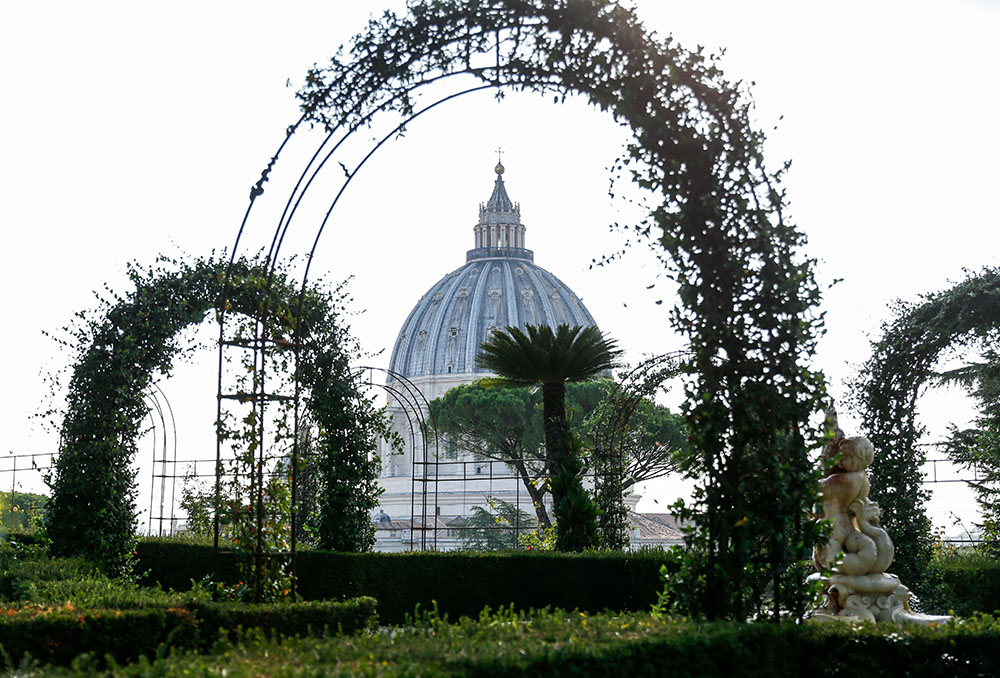
A new course offers Catholics a chance to dive deeper into Pope Francis' environmental teachings and his vision of integral ecology with guidance from academics and experts at the Vatican and beyond — all without leaving home.
The pontifical universities and athenaeums of Rome have created a joint online, English-based course on integral ecology that will lead students through Francis' 2015 encyclical, "Laudato Si', on Care for Our Common Home," and his recent follow-up Laudate Deum, an apostolic exhortation "on the climate crisis."
The course begins Jan. 25, with a 90-minute session each month through June. Enrollment remains open through March 31 and can be completed at https://immatricolazioni.unigre.it. For those who enroll after the course's start, prior sessions will be available online. There is a course fee of 30 euro, or roughly $33.
Initially offered in 2016 at the pontifical universities, the joint diploma in integral ecology consists of a total of six sessions that cover the six thematic chapters of Laudato Si', such as "What is Happening to Our Common Home?"; "The Gospel of Creation"; and "Integral Ecology."
An additional March workshop will screen the documentary "The Letter" about Francis' ecological encyclical, and an online conference on May 2 will delve further into Laudate Deum.
While focused on Catholic teaching, the course is open to anyone interested in learning more about the sacred duty to care for God's creation and protect life in all its forms, Salesian Fr. Joshtrom Isaac Kureethadam, a professor at Salesian Pontifical University and one of the course instructors, told EarthBeat.
"The initiative hopes to promote a mass movement of people from below and from all walks of life for the care of our common home and the most vulnerable in our midst," said the author of The Ten Commandments of Laudato Si'.
Each course session will be led by different instructors from the various pontifical universities across Rome, and will include expert voices from other Catholic schools, institutions and international development agencies.
Among them are Susana Réfega, newly named executive director of Laudato Si' Movement; Mauricio López of the Ecclesial Conference of the Amazon; Celia Deane-Drummond of the Laudato Si' Research Institute at Oxford University; and John Mundell, director of the Laudato Si' Action Platform.
The course advisory board includes Cardinal Michael Czerny, head of the Vatican Dicastery for Promoting Integral Human Development; Cardinal Peter Turkson, chancellor of the Pontifical Academies of Sciences and Social Sciences; and the rectors of nine pontifical universities and athenaeums.
Graduates can receive a certificate upon completing the course, as well as become official Laudato Si' animators through a program run by Laudato Si' Movement.
"The unprecedented challenge facing the planet and people can only be addressed within the lens of an integral ecological vision that Pope Francis championed in Laudato si'," the course materials state.
Raising ecological education has been a primary goal for the pope and the Vatican as a central piece of the planet's response to the rapidly growing threats from climate change and biodiversity loss.
"Only by cultivating sound virtues will people be able to make a selfless ecological commitment," Francis wrote in the Laudato Si' chapter on ecological education and spirituality.
He added, "Our efforts at education will be inadequate and ineffectual unless we strive to promote a new way of thinking about human beings, life, society and our relationship with nature."
In Laudate Deum, Francis bemoaned that in the eight years since he issued Laudato Si' "our responses have not been adequate, while the world in which we live is collapsing and may be nearing the breaking point."
He later stated: "There are no lasting changes without cultural changes, without a maturing of lifestyles and convictions within societies, and there are no cultural changes without personal changes."
The pope also sought to use the exhortation to educate as well, spending a sizable portion of its opening to counter climate denialism, "even within the Catholic Church," by presenting the latest data on climate change that he melded with moral context.
At the COP28 United Nations climate conference in December, the delegation representing the Holy See stressed the importance of education and lifestyle change in nations' collective response to climate change.
The Holy See delegation proposed adding to the Dubai gathering's concluding document a requirement for countries to include and fund climate education within climate solutions, but the proposal was not adopted.
"We need to change our way of life and thus educate everyone to sober and fraternal lifestyles," Francis said in a video message to inaugurate the first-ever faith pavilion at a U.N. climate summit. "This is an essential obligation for religions, which are called to teach contemplation, since creation is not only an ecosystem to preserve, but also a gift to embrace."
"course" - Google News
January 25, 2024 at 04:08PM
https://ift.tt/5vNBYal
Pontifical universities' online course to unpack Francis' ecological teachings - National Catholic Reporter
"course" - Google News
https://ift.tt/6eTGUHO
https://ift.tt/Vk6mGHN
Bagikan Berita Ini














0 Response to "Pontifical universities' online course to unpack Francis' ecological teachings - National Catholic Reporter"
Post a Comment